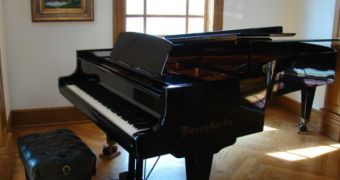Learning to play the piano is no easy task, as most of the world's musicians will tell you. It requires an extensive amount of time for would-be musicians to learn how to correctly position their fingers on the instrument, and even more time until their muscles adapt to the rigors of playing the heavy keyboards. A new invention, devised by researchers at Georgia Tech, now aims to drastically reduce the time students need in order to be able to say for sure that they've mastered a song. The new system is composed of two modified gloves, which generate cues whenever a player needs to tap a certain key.
The goal of the new device is to provide aspiring musicians who don't have sufficient time to go about studying piano the old-fashioned way, with an easy-to-use technique of setting up their muscle memory. This concept refers to the way the muscle groups tighten and release during a song, in the fingers and in the arms. The memory part refers to the fact that a well-trained musician can air-play a song from the start to the finish on an imaginary keyboard, without any mistakes.
However, learning to train one's muscles in such a manner takes decades of practice, which makes professional piano players very few and appreciated. And this is where the new system, developed by Georgia Tech graduate student Kevin Huang, comes in. The two gloves are equipped with small rotating motors placed on each finger, which are connected to a battery.
This part of the system is linked via a wireless connection to a computer, where the original song is played. A computer software triggers the small motors every time a particular finger needs to be placed on the keys. Students can basically learn the song, as far as muscle memory goes, while standing in bed. Afterwards, they can just sit at the piano, and start playing.
“You can literally feel the notes,” Huang shares. At this point, only a few songs are in the databases at Georgia Tech, but the inventor says that he could devise a way for the gloves to be connected to an iPod, or other personal music players, which will constitute an incredible advantage for aspiring musicians.
“It's not a replacement,” Huang holds, adding that classic piano professors shouldn't frown on his invention. “If somebody wanted to learn in a traditional way, they still can. This just augments it. It provides a new, alternative way to learn the piano for people who don't have time for the traditional, vigorous process,” he points out.

 14 DAY TRIAL //
14 DAY TRIAL //